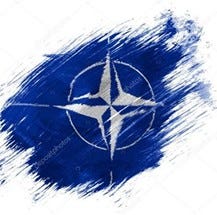At the end of every war, there is a period where decisions are made that determine the length and nature of the period of relative peace that follows. It is up to the leaders at that moment and afterward to follow those commitments to determine the results that follow.
History has judged the victorious leaders in World War I harshly for their actions at the end of that war. Vindictive and harsh penalties imposed on Germany were seen as a contributing factor to the rise of Hitler and a significant influence in World War II. The post-war treatment of Germany and Japan was very different based on this understanding of prior actions.
When World War II ended, a "Cold War" began between the United States and the Soviet Union. Both sides had buffer zones. We had oceans and complained loudly when the Soviets tried to put nuclear missiles in Cuba. Two military alliances existed in Europe. The U. S. led the North Atlantic Treaty Organization (NATO), and the Soviets led the Warsaw Pact. Their buffer didn't extend all that far. Finland sat on their border and was neutral. Heading west, NATO came as close as the middle of Germany, but there was some distance. They expressed concern when we talked about putting certain types of missiles in various European locations. Both countries measured travel times and missile speeds to determine how much time they would have to react after an attack. This caution was not paranoia in a world of "Mutually Assured Destruction."
The Cold War lasted about 44 years (1945-1989) and ended with the fall of the Soviet Union. In 1990, Mikhail Gorbachev attended international meetings to discuss the possibility of a united Germany. This idea troubled many people throughout Europe, but Russia had special reasons for concern. Russia has no oceans as borders against enemies. It has been invaded endlessly. Unlike the Soviet Union, Russia did not have the string of Warsaw Pact states as shields against Western Europe or Germany.
NATO's enemy, the Soviet Union, was gone. Russia wanted to be willing to interact commercially with Europe. It had crops and petroleum products to sell. Gorbachev agreed to the unification of Germany when he thought he was promised what he needed. But America's word was no good. He thought James Baker and others had promised that NATO would move "not one inch eastward."
Declassified documents show security assurances against NATO expansion
Washington D.C., December 12, 2017 – U.S. Secretary of State James Baker's famous "not one inch eastward" assurance about NATO expansion in his meeting with Soviet leader Mikhail Gorbachev on February 9, 1990, was part of a cascade of assurances about Soviet security given by Western leaders to Gorbachev and other Soviet officials throughout the process of German unification in 1990 and on into 1991, according to declassified U.S., Soviet, German, British and French documents posted today by the National Security Archive at George Washington University
Instead, NATO moved to absorb almost every nation up to Russia. Six former Warsaw Pact nations had become part of NATO before the Ukraine incursion: Albania, Bulgaria, Czechoslovakia, Hungary, Poland, and Romania. Also, Latvia, Lithuania, and Estonia were part of NATO. They weren't Warsaw Pact countries because they weren't separate enough from Russia to have a distinct role. Moscow's leaders wondered if NATO would stop before the Bering Strait.
Recent revelations about the actions of the Agency for International Development (A.I.D.) prove that the so-called "conspiracy theories" about CIA interference in European politics were not theories. NATO supporters complained about Russian interference and argued that support for the West and NATO was always and only purely "grassroots." Instead, it turns out that much of the green cash in the "green grass" supporting NATO was "astroturf."
When the public votes for a more neutral position or even a position favorable to using Russian energy resources, western leaders refuse to accept it. Romania's supreme court just canceled an election that produced an "unacceptable" result.
A.I.D. interference in Ukraine and the nation of Georgia has gone beyond Russia's stated redlines. To be clear, these are not Putin's arbitrary decisions but the Russian leadership's shared views. These nations border Russia. They are not ninety miles away like Cuba.
In 2014, Russia thought it would get a lease for the base and port at Sevastopol at the tip of Crimea. In February 2014, democratically elected Ukrainian President Viktor Yanukovych tried to work with both sides. He was about to lease the Crimean port of Sevastopol to the Russians. When he tried to do this "balancing act" between West and East, a "Maidan Revolution" occurred with help from the National Endowment for Democracy and various NGOs. U.S. Senators John McCain (R‑AZ) and Chris Murphy (D‑CT) traveled to Kyiv to show their support for the revolution. Some embarrassing recordings surfaced. U.S. State Department official Victoria Nuland discussed who Ukraine's next leader should or should not be. Her choice did, indeed, win.
Putin's reaction was swift. He sent troops in to reclaim Crimea as part of Russia.
That was 2014. In 2021 and 2022, another set of warnings and misunderstandings existed before Russia went into Ukraine with the "Special Military Operation."
Again, there is a misunderstanding. Our leaders believe they are pure and wonderful and can't understand why anyone could disagree with them or feel threatened by them anywhere. Domestically, they refuse to believe voters could fail to see their wisdom. Internationally, they refuse to understand some nations view their actions as threatening. Those nations won't change their forms of government and their societies to meet some Kumbaya vision of Davos.
Those who want to keep their way of life see self-righteous nations trying to impose their will in every possible way. Countries aligned against them use force, sanctions, and courts to get the results they want. There is nothing friendly or benevolent in those actions. Those who resist will defend themselves in every way they can.

